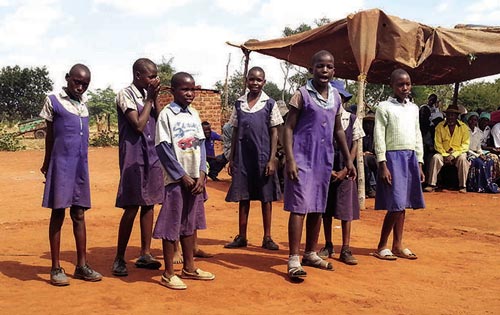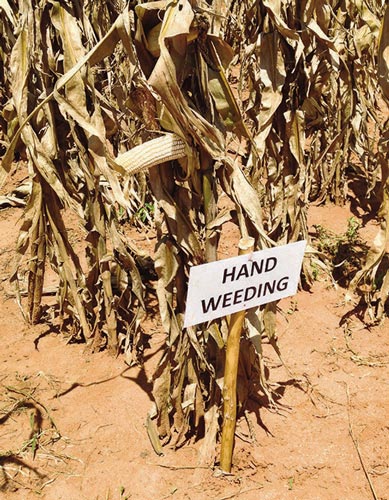By Florence Sipalla and Jill Cairns/CIMMYT

CIMMYT scientists working on the CGIAR Research Program on Climate Change, Agriculture and Food Security (CCAFS) have identified the most suitable maize varieties for high temperature and drought-prone environments in Zimbabwe. The scientists have been conducting research on drought- and heat-tolerant maize varieties in areas that are vulnerable to climate variability and climate change in Zimbabwe. Working in collaboration with Sustainable Agriculture Technology (SAT), a local NGO, the scientists are testing the suitability of drought- and heat-tolerant varieties as a solution to challenges farmers face in “climate hotspots.”
These farmers are vulnerable to climate change due to erratic and limited rainfall, a situation that is worsened by increasing temperatures. “To identify these areas, we looked at climate change patterns across Zimbabwe which allowed us to identify five wards: Bikita, Gokwe, Gutu, Mutare and Zaka,” said CIMMYT physiologist Dr. Jill Cairns. The scientists then downscaled projections of monthly changes in rainfall and temperature in these wards to confirm their vulnerability and get a better understanding of the seasonal changes likely to occur by 2050.

In partnership with SAT, scientists are screening drought- and heat-tolerant maize varieties in demonstration plots using different farmer-managed practices that are accessible to local communities. “SAT has very good links to extension leaders, which has helped us reach the community,” said Cairns. “It holds field days at each demonstration location and has managed to engage locally.” During these events, farmers are provided with information on climate change, improved maize varieties and modern agricultural practices. Cairns said highlights from field days she has attended included seeing schoolchildren sing about climate change and agriculture, and a group of HIV-positive women singing about agriculture and improved seed. The drought-tolerant maize varieties used in this study are from the Drought Tolerant Maize for Africa (DTMA) project breeding pipeline, which is funded by the Bill & Melinda Gates Foundation. The research on heat is a component of DTMA being funded by the U.S. Agency for International Development (USAID).
 Climate adaptation and mitigation
Climate adaptation and mitigation